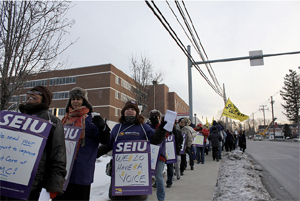Wisconsin, Everywhere

While all eyes turn to the huge rallies and political turmoil playing out in the Midwest—Wisconsin has been joined by Ohio, Indiana, and tomorrow Michigan—workers elsewhere fight the same battles on smaller stages. Service and maintenance workers at Pocono Medical Center in East Stroudsburg, Pennsylvania, stood firm against union-busting and went out on their first-ever strike. The one-day action February 9 hit their employer for refusing to negotiate in good faith and illegally interfering with workers’ rights to discuss workplace issues on their own time. The unfair labor practice strike by 550 members of Service Employees Healthcare PA followed management’s failed bid to deauthorize the union last year. Though an overwhelming majority of workers voted for a closed shop, to have more strength to advocate for their patients and themselves, the hospital refused to honor PMC workers’ democratic vote. The National Labor Relations Board issued a complaint in fall 2010 over the hospital’s illegal interference in workers’ rights to discuss workplace issues. “The NLRB’s complaint shows that management is willing to do anything, including breaking the law, to weaken or get rid of our union,” said Madeline Vazquez, a unit clerk. In Wisconsin, the themes are similar: refusals to negotiate with unions, threats of yearly deauthorization votes, and attempts to choke off unions’ ability to speak out. The numbers may be smaller in Vermont, but the motivations on both sides are the same: public sector management looks to cut costs and 60 Teamster bus drivers in Burlington are fighting for union contracts that safeguard the public. “Management has a computer spitting out our schedules,” said 20-year driver Mike Walker, chief steward for Teamsters Local 597, “but if we try to keep to the schedule, we almost have to break traffic laws. If we don’t keep to the schedule, riders aren’t getting what they need from a public bus company.” Give $10 a month or more and get our "Fight the Boss, Build the Union" T-shirt. On February 13 nearly 100 community members—riders, students, and union members—showed their support in an exuberant rally at Burlington City Hall. “We’re in the middle and we have to stand up,” Walker said. Other sticking points in the contract dispute with the Chittenden County Transportation Authority include management’s proposal to greatly expand part-time positions. “We know what this is about,” said Jim Fouts, a driver and Teamsters for a Democratic Union activist. “They don’t want to pay benefits, retirement, sick leave—those things which really allow workers to enjoy some basic decent life. “Remember the UPS strike in 1997? That was also over exploitation of part-timers. And all over America, everyone recognized that problem, so the public rallied in support of those UPS strikers.” Students at both the University of Vermont (UVM) and St. Michael’s College—heavy users of county buses—have surged to support the drivers. Daniel Filstein of Students Stand Up at UVM pointed out in a resolution adopted unanimously by the student senate that UVM pays CCTA roughly $300,000 a year for bus services. The crowd was moved by Donna Iverson, a teaching assistant at Burlington High School and member of the Burlington Education Association/NEA, when she described her reliance on bus service and said she has never seen a driver show anything less than patience, respect, and compassion for all passengers. She proposed starting a Bus Riders Union to support the drivers. After the rally, driver Rob Singerland reflected that “the support I saw was unreal. And that woman who said when it comes to the needy, homeless, and handicapped, that we show nothing but compassion, and how we take our time regardless of the time schedule to do so, made me feel good. Really good! Good about what I do, what we do, for a living.” Despite a year of slow negotiations, threats by management, and some internal struggle against Local 597 leaders to gain rank-and-file control of bargaining, Singerland said the rally made him see that “this negotiation is bigger than just us and the company. To think that all these people are supporting us, that 60-plus drivers in small-town USA have a good chance of becoming an example of what anyone can accomplish, is just amazing to me.”
SUPPORT LABOR NOTES
BECOME A MONTHLY DONOR




